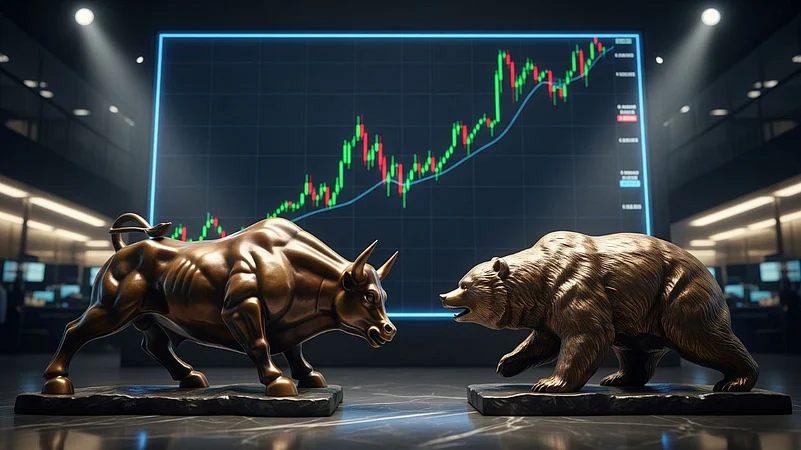Equity benchmark indices ended lower on July 31 after a volatile session, as investors digested US President Donald Trump's 25 per cent announcement of tariffs on Indian goods. Volatility was further amplified by the monthly derivatives expiry, which typically triggers heavy intraday fluctuations.
The Sensex settled in the red after a turbulent session, having slipped sharply in early trade before staging a partial recovery and briefly turning positive later in the day. At close, Sensex was at 81,185.58, down 296.28 points, or 0.36 per cent. Similarly, Nifty 50 too witnessed sharp swings in both the territories, eventually ending lower by 86.70 points, or 0.35 per cent, at 24,768.35.
Broader markets mirrored the sentiment as the Nifty Midcap 100 declined 0.93 per cent, the Nifty Smallcap 100 fell 1.05 per cent, and the Nifty 500 ended lower by 0.51 per cent. The Nifty microcap 250, which tracks the top 250 companies beyond Nifty 500 constituents, also slipped 0.71 per cent.
FMCG Bucks Trend, Oil & Gas Lead Losers
On the sectoral front, barring FMCG, almost all major sectoral indices closed in the red. Nifty FMCG, surged 1.44 per cent on the back of Hindustan Unilever's strong Q1 earnings and amid sentiments that the sector woul remain insulated from tariff risks.
Vinod Nair, Head of Research, Geojit Investments, said, "Investors gravitated toward domestically oriented, non-discretionary players, especially FMCG, which offered attractive valuations, demand outlook and relative insulation from tariff risks."
The top loser was Nifty Oil & Gas, dragged by Reliance Industries' 1.43 per cent decline. "Oil & gas stocks were the worst hit due to US warnings over Indian energy imports," Nair explained.
Following it, Nifty Pharma fell 1.31 per cent, Nifty Metal plunged 1.22 per cent, and Nifty Healthcare tumbled 1.07 per cent. Other major sectoral indices such as Nifty IT, Nifty Auto, Nifty Financial Services, Nifty Realty, Nifty PSU Bank, and Nifty Private Bank also closed in red.
Nifty Bank, which tracks the performance of the top 12 private and public banks, slipped 0.34 per cent to end at 55,961.95.
Sensex, Nifty 50: Top Gainers & Losers
Among Sensex's 30 stocks, Hindustan Unilever gained the most, rising 3.48 per cent, followed by Eternal (formerly Zomato), ITC, Kotak Mahindra Bank, and Power Grid, all gaining in the range 0.5 per cent to 1.5 per cent. On the other hand, Tata Steel, Sun Pharma, Adani Ports, Reliance Industries, NTPC, and Asian Paints dragged the index.
From the Nifty 50 pack, Hindustan Unilever, Jio Financial Services, JSW Steel, Eternal, Kotak Mahindra Bank, and ITC were the top gainers, while Adani Enterprises, Tata Steel, Sun Pharma, Dr Reddy's Laboratories, NTPC, Reliance Industries, and Adani Ports were the top losers.
Key Market Cues For Tomorrow, August 1
Here are the key market cues investors will likely be reacting to in the last session of the week on August 1, 2025.
Trump's Tariffs
Late on July 30, US President Trump announced 25 per cent tariffs on goods imported from India, plus a "penalty" for buying Russian oil and weapons. However, details of the India-US trade deal is yet unclear.
Investors will be closely tracking more on this to gauge sectoral impacts of the agreement.
Q1 Results, August 1
As many as 96 companies listed on the Bombay Stock Exchange (BSE) are going to report their quarterly results for the period ended June 30, 2025 (Q1 FY25). Among the major names are Adani Power, ITC, Tata Power, UPL, LIC Housing Finance, Delhivery, Multi Commodity Exchange of India (MCX), Godrej Properties, Graphite India, GR Infraprojects, and GlaxoSmithKline Pharmaceuticals.
US Economic Growth
The US Federal Reserve kept interest rates unchanged at 4.25 per cent on July 30, despite repeated criticisms from US President Trump to cut rates. Fed Chair Jerome Powell said the central bank is focused on bringing inflation under control and not on lowering government or home loan rates as Trump has demanded.
Powell also warned that Trump's new trade policies and changes to import taxes could push prices higher, making it too early for the Fed to start cutting rates. He added that the central bank is still assessing how these policy shifts will affect inflation, jobs, and overall economic growth.
Investors will now be watching for incoming US inflation and job data, which will give direction to the Fed's next steps. The US will be releasing unemployment data on August 1, along with manufacturing PMI growth figures. Inflation data for July 2025 is expected to be released by August 12.
India Monthly Automobile Data
India's automobile companies will be reporting their monthly sales data on August 1, which will give insights into demand trends across passenger vehicles, two-wheelers, and commercial vehicles, and the impact of monsoon progress on rural sentiment.
The sales numbers will also be seen as a clue to how people are spending and how strong the economy is looking ahead of the festive season.
India Manufacturing PMI
S&P Global is expected to release India's manufacturing PMI growth data on August 1. Better-than-expected PMI data could lift market sentiment, while weaker numbers may trigger concerns about demand, supply-chain issues, or rising costs.














